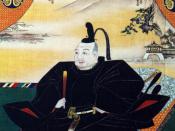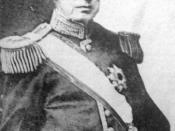The Meiji Restoration occurred through a number of substantial changes to the old Tokugawa regime. The most significant of these changes, however, in permanently implementing this new regime, was the modernisation of the education system. The goal of the Restoration period was to learn from the western countries by borrowing the best technology available, whilst avoiding the mistakes traditionally associated with industrial development. With the power of hindsight, Japan successfully enriched the nation and strengthened their military.
To fully appreciate the improvement in education brought about by the Meiji Restoration, it is important to examine the state of affairs in the Tokugawa period, from 1600 to 1867. Albert Craig has commented on the transition into Restoration, saying, "Dissatisfactions were not the sole or even the chief internal factor determining the course of the Restoration. On the contrary ... the Restoration stemmed more from the strength of the values and intentions of the old society than from their weaknesses."
The Tokugawa regime had reunified Japan by 1603; and by 1640, foreigners had been ordered out of Japan, Christianity banned, and virtually all outsider contact prohibited. The nation then entered a period of isolation and relative domestic tranquility, which was to last 200 years. When the Tokugawa period began, few common people in Japan could read or write. By the period's end, however, learning had become widespread.
Samurai curricula stressed morality and included both military and literary studies, as well as arithmetic and calligraphy; their formal education and literacy increased proportionally. Education of commoners was generally practically-oriented, providing basic training in reading, writing, and arithmetic, emphasising calligraphy and use of the abacus. Tokugawa education left a valuable legacy: an increasingly literate populace, an ideology based on merit, and an emphasis on discipline and competent performance. Under subsequent Meiji leadership, this...


